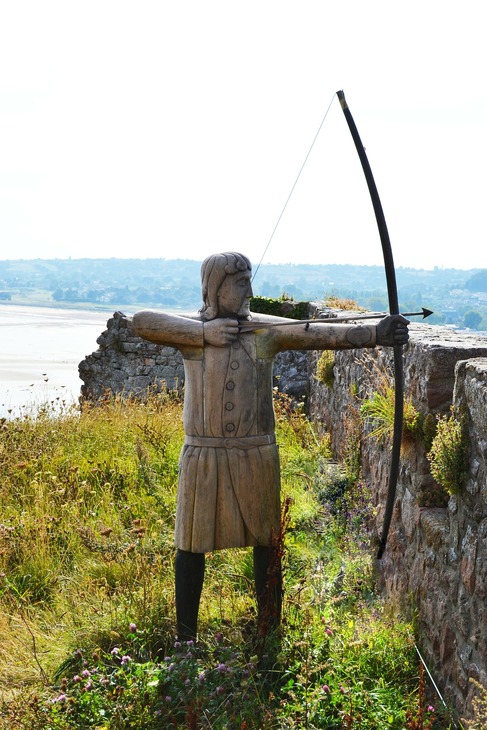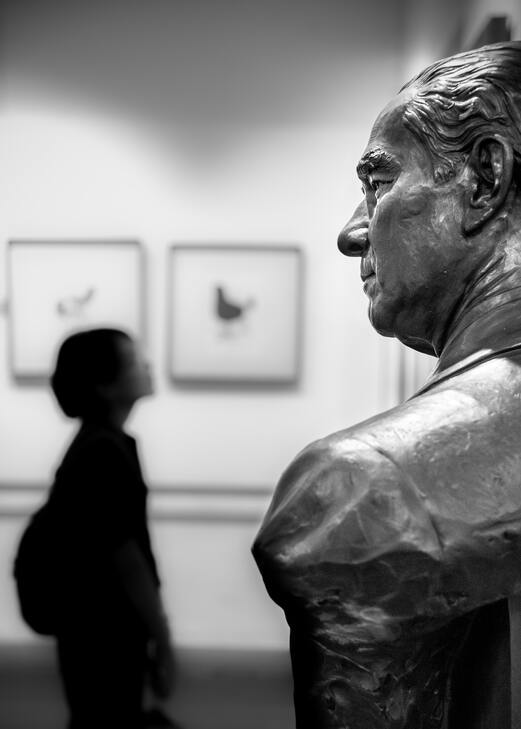Bard is not just an ordinary smuggler. Well, to be honest, he is not a smuggler at all, but a man who is willing to risk his own life and freedom for the chance to help the Dwarves cross the Long Lake. Even with spies surrounding his usual routes and his home, he is able to sneak the Dwarves into his home, welcoming them into the privacy of his own dwelling, so as to keep them from being discovered.
Warming blankets
Bard: “They may not be the best fit, but they’ll keep you warm.”
Bilbo: “Thank you very much.”
Everything that Bard can give to the Dwarves of his own possessions is a bit too cumbersome for the stocky built race. On the other hand, it leaves enough cloth left over to cover every square inch of their bodies. Bilbo still prevails as the nicest of the company.
Though money had been paid for the Bard to take them across the lake and provide them with weapons, he still makes sure they do not freeze to death given the temperature of the lake from which they had to climb out. He could have given them their weapons and let them go on their way, leaving their fate up to them.
This way, however, he made sure that the company stayed out of sight of the Guards, and led them into his own house. The Dwarves seem to take all of his efforts for granted, forgetting that it wasn’t a part of the deal for him to care for them in this particular manner.
Dwarvish windlance
Thorin: “A Dwarvish windlance.”
Bilbo: “You look like you’ve seen a ghost.”
Balin: “He has. The last time we saw such a weapon a city was on fire. It was the day the dragon came. The day that Smaug destroyed Dale. Girion, the Lord of the city, rallied his bowmen to fire upon the beast. But a dragon’s hide is tough. Tougher than the strongest armor. Only a Black Arrow fired from a windlance could have pierced the dragon’s hide. And few of those arrows were ever made. The store was running low when Girion made his last stand.”
Thorin: “Had the aim of Men been true that day much would have been different.”
Now we hear there is one other resentment, one other prejudice of Thorin’s, aside from that against the Elves. According to Thorin, the Men of Dale were to blame for the destruction and robbing of their home. Had Lord Girion made a more precise shot and harmed the beast fatally they would have not had the need for exile out of their homeland. It is interesting to note that Thorin does not see blame in his own people, specifically his grandfather’s behavior.
In the Prologue, we have seen that Thorin had witnessed his grandfather succumb to madness and his desire to dwell inside his treasure horde. Had greed not taken over the ruling Dwarf of Erebor and thus emanated a fear of loss of his possession the dragon may not have attacked the kingdom. As Bilbo said, “where sickness thrives, bad things will follow.” And they certainly did.
Lord of Dale
Girion, Lord of Dale, was played by the same actor that plays Bard, Luke Evans. While in production, Peter Jackson asked him if he would take on the role of his grandfather, and Luke Evans was excited to play him. The makeup and costumes department did their very best to scrounge up young Mr. Evans into looking like his grandfather. And they succeeded. There was an air of nobility, confidence, and pride that went with the character of Girion, which Luke Evans emanated successfully.
Discrepancy in stories
Bard: “You speak as if you were there.”
Thorin: “All Dwarves know the tale.”
Bain: “Then you would know that Girion hit the dragon. He loosened the scale under the left wing. One more shot and he would have killed the beast.”
Dwalin: “That’s a fairy story, lad. Nothing more.”
There are always two sides to every story. Even if the truth is spoken does not mean that everyone will believe it. The Dwarves could not have seen or known that the dragon had been injured from the Black Arrow. Their only concern was to flee their home and seek sanctuary. Girion had a better view from under the dragon’s belly to see if he had injured it, giving more credence to his story than what the Dwarves were told.
The Dwarves, thinking Men incapable of doing anything right, kept to their own opinion of the events of that day, disbelieving that the dragon had suffered any injury whatsoever. Dwalin even mocks young Bain for believing in such a fairy story. Even if the story were untrue it is unfair to disrespect what someone believes to be true, especially in a mocking tone like Dwalin has done.
Quiet concerns
Thorin: “You took our money. Where are the weapons?”
Bard: “Wait here.”
Thorin: “Tomorrow begins the last days of autumn.”
Balin: “Durin’s Day falls the morn after next. We must reach the mountain before then.”
Kili: “And if we do not? If we fail to find the hidden door before that time?”
Fili: “Then this quest has been for nothing.”
While Bard runs out to collect the weapons he had promised the Dwarves, they gather together to discuss what the consequences of a delay will be. The fact that they had a Man help them out with crossing the Long Lake and providing them with warm blankets and weapons, still does not guarantee that they will reach the Mountain in time. And if they don’t, there will be nothing else they can do other than swallow their pride and admit failure.
Thorin and Balin are more positive about the outcome of the quest than the younger generation is. Fili and Kili fear they may not be successful in finding the hidden door and reclaiming their homeland.
Defenselessness of Lake-town people
Thorin: “What is this?”
Bard: “Pike hook. Made from an old harpoon.”
Kili: “And this?”
Bard: “A crowbill, we call it. Fashioned from a smithy’s hammer. It’s heavy in hand, I grant but in defense of your life, these will serve you better than none.”
Glóin: “We paid you for weapons. Iron-forged swords and axes!”
Bofur: “It’s a joke!”
What weapons can a bargeman have than something he had either forged himself or had someone he trusted forge it for him. It is obvious by the hiding place of the weapons, that it is not for the common folk to keep it in their homes. The mere fact that they had to be forged from fishing equipment and smith’s rejectables tells us that there are no weapons to be had in Lake-town.
The defenselessness of the common folk residing in Lake-town is purposefully done. The Guards and, of course, the Master of Lake-town are the only ones deserving enough to have weapons at their disposal. This then also means that if there were an attack on the town, the Men of the Lake could count on their Guards to protect them and their livelihood. Right.
Ungrateful
The Dwarves find Bard’s idea of weapons a joke. It wasn’t what they expected to be handed with when they made the deal. They couldn’t have known what the situation was in Lake-town regarding weapons, so their disappointment is all their own fault. Had they asked Bard in advance about the kind of weapons they will be handed, they would have probably only taken Bard’s service of transfer and handled the weapons themselves.
Bard could not have given them anything else than what he already had to protect himself and his family. More than anyone else could have offered them. But it appears this wasn’t enough for the Dwarves either. Considering they are out of clothes, weapons, and everything else they packed that was taken away from them in the Woodland Realm, they should be grateful for any help given, any piece of clothing taken from Bard’s own kids’ needs and given them. But, apparently, that is not the case.
The Dwarves cannot see past their own needs and their own lives. And they certainly cannot appreciate someone else’s sacrifice for their freedom.
Follow me to my next post.





